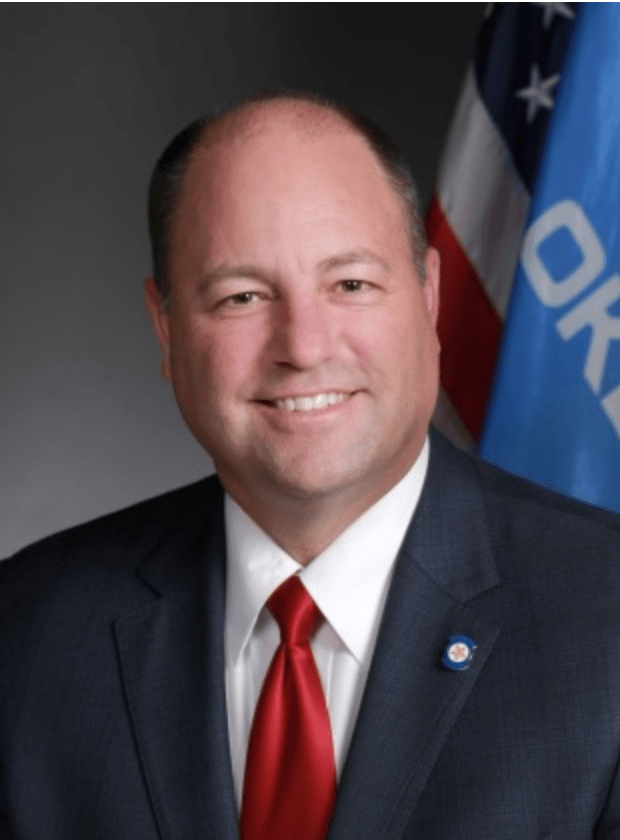
A state senator who filed a bill this week that would eliminate a Medicaid program for low-income pregnant women defended the proposal, saying the program shouldn’t provide benefits to undocumented mothers.
In a press release sent out to reporters on Thursday evening, Sen. Paul Scott, R-Duncan, said he filed the bill because he hoped to “stop state funds from providing healthcare to pregnant illegal immigrants.”
“I filed this bill to bring to light the fact that the federal government is forcing states and hardworking taxpayers to foot the bill for illegal immigrants to have their babies in the U.S. This isn’t right,” Scott said. “They are in the country illegally.”
Scott, through an assistant, declined an interview request from The Frontier on Thursday afternoon.
The Frontier reported on Scott’s proposed bill (Senate Bill 40) on Wednesday and found that cutting the program would set Oklahoma on a trajectory to lose more than $91 million in federal Children’s Health Insurance Program funding.
In the press release, Scott said the federal government has “tied” states’ hands.
“As a medical professional, I understand the importance of prenatal care but these mothers are illegal immigrants,” he said. “Our responsibility is to the taxpayers of this state, not illegal immigrants.”
The state’s Soon-to-be-Sooners program provides pregnancy health care services to low-income pregnant women. The program is part of Oklahoma’s Medicaid program, known as SoonerCare. Medicaid uses state and federal money to offer health coverage, and uses a fee-for-service system to reimburse providers for procedures.
Scott authored a similar bill in 2017, but it was unsuccessful.
The Soon-to-be-Sooners program serves two categories of pregnant mothers:
- Citizens earning 138 percent to 185 percent of the federal poverty level get limited services under the federal-state Children’s Health Insurance Program (CHIP).
- Noncitizens earning up to 185 percent of the federal poverty level receive limited services under CHIP.
The program provided pregnancy and maternity services to about 9,800 mothers in fiscal year 2018 (6,200 were undocumented), and paid out more than $15.7 million in reimbursements, according to data provided by the Oklahoma Health Care Authority, which oversees the program.
Of that $15.7 million, $14.8 million came from the federal government.
After The Frontier published its story on Wednesday, Scott took to his Facebook page to defend the bill from angry commenters, stating the bill would eliminate “the program for illegal mothers, not legal mothers.” However, Scott’s bill does not distinguish between the two.
Scott also stated on Facebook that federal law prohibits states from providing Medicaid services to undocumented immigrants. Undocumented immigrants aren’t eligible for most government benefits program by law, including regular Medicaid coverage.
However, they can get coverage through some Medicaid programs, such as the Soon-to-Be-Sooners program. The program, laid out in the state’s CHIP plan, was most recently approved by the federal Centers for Medicare and Medicaid Services in May 2016.
Undocumented women qualify for the program because its services are aimed to the benefit of the unborn children, who meet the citizen requirement at birth. Mothers lose benefits as soon as the pregnancy is over.
Scott said he believes the program discourages undocumented immigrants from seeking citizenship.
“Why would they go through the hassle of seeking citizenship or returning to their home country when we’re providing them free services,” he said. “It makes no sense. If they can fill out paperwork for free medical care, they can fill out paperwork to become taxpaying citizens and pay for their health services like other Americans and Oklahomans.”
SB40 Int (Text)
Through federal matching funds, CHIP, which funds Soon-to-Be-Sooners, helps states provide insurance to families who earn too much to qualify for Medicaid but cannot afford private insurance. In Oklahoma, CHIP is operated as part of SoonerCare and provides health insurance to thousands of low-income children.
When Congress extended the CHIP program earlier this year, the bill came with requirements for the state that included a condition against making reductions to eligibility benefits through FY 2027.
If Oklahoma eliminated or restricted its Soon-to-Be-Sooners program the state would fail to meet those requirements and be considered noncompliant. The SoonerCare program, which receives state and federal funds, would no longer qualify for CHIP funds.
Scott said he encourages Oklahomans to call their congressman to request to have the requirement removed.
More than 191,000 Oklahoma children qualified for CHIP benefits in FY 2017, according to the agency’s annual report.
Pregnant women can qualify for SoonerCare depending on their income.
Related reading:
Proposed bill would eliminate Medicaid program for low-income pregnant women



